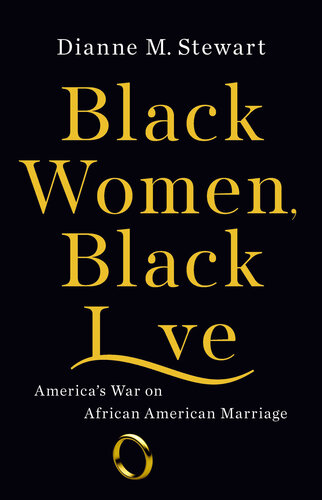
Black Women, Black Love
America's War on African American Marriage
کتاب های مرتبط
- اطلاعات
- نقد و بررسی
- دیدگاه کاربران
نقد و بررسی

August 17, 2020
Stewart (Three Eyes for the Journey), a professor of religion and African American studies at Emory University, examines the “structural forces” that have led to disproportionately low marriage and high divorce rates among heterosexual African Americans in this thought-provoking account. She characterizes “Black women’s lack of options for suitable love and partnership with Black men” as “America’s most hidden civil rights issue,” and traces the root causes back to slave laws that deprived African American women of the right to control their romantic and reproductive lives. After the Civil War, Stewart writes, federal and state authorities established parameters for “legitimate” marriage that didn’t necessarily reflect Black experiences or desires, and racially motivated violence undermined marital and family stability. Stewart also reveals how allegations of “welfare fraud” have been used to shape Black women’s behavior to a white patriarchal model, notes the devastating effects of racial bias in the justice system, and critiques self-help solutions to Black women’s romantic challenges offered by TV shows like Being Mary Jane. Though she writes in an academic register, Stewart folds in intriguing personal reflections and pop culture analysis. The result is a well-documented and persuasive case that supporting Black love and marriage is a key step in unwinding racial inequality in America.

Starred review from August 15, 2020
A professor of religion and African American studies offers a compelling look at Black women's love relationships through a historical lens. As Stewart notes, 70% of Black American women are unmarried, largely due to circumstance rather than by choice. The author examines the social, economic, and cultural conditions for heterosexual Black women who want to fall in love and get married but have few prospects as a result of historical, systemic problems that have plagued their love relationships and marriage outcomes since slavery. Love, coupling, and marriage among enslaved people were burdened by "expectations of fracture" due to the sale of a loved one or other separations. In painstaking and painful detail, Stewart chronicles how even after Emancipation, the likelihood of domestic terror in the form of lynchings, torture, and the wholesale massacre of thriving Black communities "haunted Black couples and families well into the twentieth century." Those who did survive bore the burdens and restrictions inherent in the systems of patriarchal marriage and unrelenting poverty. Further, abusive federal and state "man-in-the-house" policies targeted Black women, stripping their families of public assistance benefits if boyfriends or husbands were present in the home. Such policies essentially punished Black women for seeking companionship and romantic love, denying them vital sources of "financial and emotional support." Not surprisingly, Black marriage rates declined significantly in the 1960s and '70s. But the most pernicious impact on Black love and marriage has been wrought by mass incarceration. More than twice as many Black men were under correctional control in 2013 than were enslaved in 1850. Stewart interweaves such eye-opening statistics with engrossing personal narratives of contemporary and enslaved women whose lives (and deaths) are a testament to the complexity of Black women's quests for love and a celebration of their resilience in the face of daunting odds. A beautiful, strikingly original work that is both scholarly and deeply moving.
COPYRIGHT(2020) Kirkus Reviews, ALL RIGHTS RESERVED.

Starred review from October 1, 2020
Based on her "Black Love" seminar at Emory University, this latest book by Stewart (Three Eyes for the Journey) is an incisive history of Black companionship, beginning with the separation of families during slavery. As Stewart states, family ties were severed in Africa, with husbands and wives on separate slave ships, and, later, on auction blocks in colonial America. Using extensive primary sources, the author shows how slavery made marriage unworkable as spouses, or children, could be separated at any time, with many never known each other's fate. This isn't an easy read, and it shouldn't be--Stewart skillfully relates Black women's lack of autonomy during slavery and how they have been blamed for their own victimization. Later chapters describe the lasting impact of lynchings during Jim Crow, leading to an increase in widows, followed by migrant marriages during the Great Migration and, ultimately, racist welfare policies and mass incarceration in the late 20th century. Noting that Black women are least likely to marry than other races, Stewart contends that we must address oppressive ideologies that paint Black women as undesirable, as well as colorism within our own community. VERDICT Filling a need for research on Black love and marriage, this seminal social history will enlighten a variety of readers.--Stephanie Sendaula, Library Journal
Copyright 2020 Library Journal, LLC Used with permission.

























دیدگاه کاربران